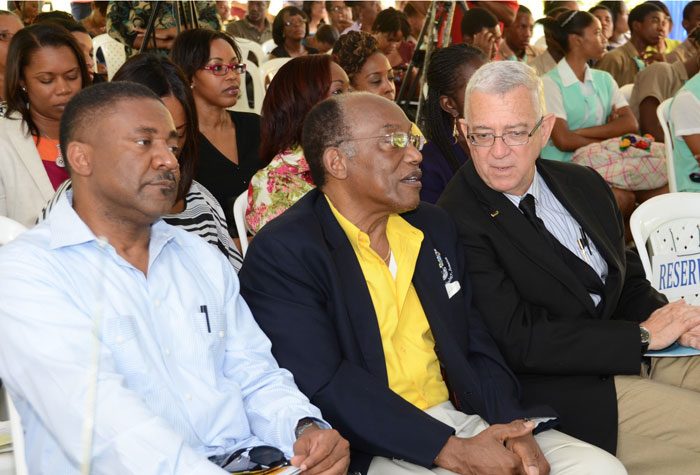UTech Develops Software to Assist Deaf Students
By: , February 27, 2014The Key Point:
The Facts
- The software was presented to the institution by the University of Technology (UTech).
- The software has the potential to be used to instruct another 35,000 students who are slow learners under the Alternative Secondary Transition Education Programme.
The Full Story
Students at the Lister Mair Gilby School for the Deaf are benefiting from U-TOUCH, software which uses Jamaican sign language to teach English Language to deaf and hard of hearing students.
The software was presented to the institution by the University of Technology (UTech), during a ceremony held on the school compound, Hope Estate, Kingston, on February 26.
Minister of Education, Hon. Rev. Ronald Thwaites, who witnessed the handing over, commended the University of Technology, in particular the leadership of the College of Business and Management (COBAM), for the ground-breaking research.
“This is a sign that you are fulfilling your mandate to use knowledge of science and technology to innovate useful products that can improve the quality of life for the Jamaican population,” Rev. Thwaites said.
He also lauded UTech for focusing its applied research on institutions and organisations in the surrounding community to positively impact the lives of people.
Rev. Thwaites noted that the software has the potential to be used to instruct another 35,000 students who are slow learners under the Alternative Secondary Transition Education Programme.
“That linkage will draw many others into the field of achievement. The Ministry of Education is anxious to facilitate the widespread training of Special Education and other teachers in the use of this methodology,” he said.
Chair of the Lister Mair Gilby School for the Deaf, Mrs. Carole Fox, said the software will make a difference in the lives of the students at the institution.
“We are grateful for the interest in our school and the community at large, and applaud the team (at UTech) for development of this software. We are hopeful that this is only the start of greater things to come in the field of deaf education from UTech and we are sure that the forging of this relationship will be able to help the deaf community a lot more,” Mrs. Fox added.
Associate Professor and Dean of COBAM, Dr. Paul Golding, explained that the software will focus on assisting the deaf and hearing impaired students to understand prepositions, which in turn will enhance their reading and comprehension skills.
“Prepositions are not part of the deaf language, so it was so important for us to have a clear understanding of the problem and understand the socio cultural issues surrounding it. So, the significance of the development of this software is far reaching. It goes beyond just Jamaica, because what we are looking at is a framework for development,” Dr. Golding said.
For his part, Minister of Science, Technology, Energy and Mining, Hon. Phillip Paulwell, expressed his appreciation to UTech, and noted that all disabled persons must be ready for the job world and should be gainfully employed.
“They can only be effectively and gainfully employed by utilizing technology to the fullest,” Mr. Paulwell said.
Based on the country’s population census, there are 12,000 deaf and hard of hearing persons and 63,000 mild hard of hearing persons. The software has the potential to assist all 75,000 to learn prepositions.



